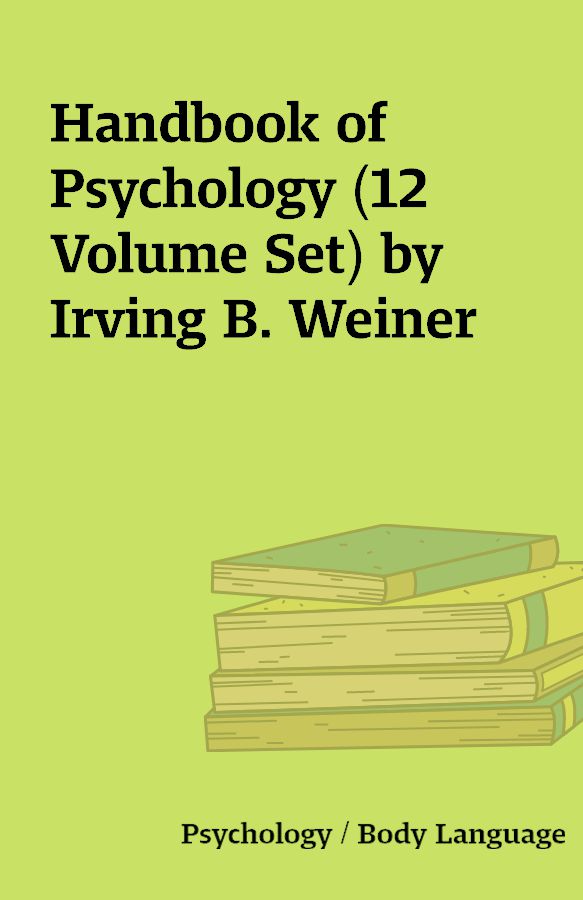Handbook of Psychology (12 Volume Set) by Irving B. Weiner
Handbook of Psychology (12 Volume Set) by Irving B. Weiner.pdf
Description
Brief Product Description* First of its kind, sure to set the standard for future psychology reference works.* Provides psychologists, practitioners, researchers, and students with complete and up-to-date information on the field of psychology.* Twelve volumes cover all of the fundamental areas of knowledge in the field. RRP: $2,640.00——————Full Product DescriptionUnlike an encyclopedia, the volumes in this set can stand alone as state-of-the-field handbooks. Together they cover both the science and the practice of psychology broadly and in depth. Each volume has its own editor(s) and contains some two dozen articles by experts who write well for an audience intended to include graduate students in behavioral science, professional psychologists who need a refresher course in their own specialty and/or an introduction to others, and educated readers outside of psychology who want to delve into it. Organized with great care, the set has a logical integrity unified by two threads: the history and evolution of each topic and the importance of research. Accordingly, the first two volumes treat history and research methods. The next five present content areas, and the last five are devoted to applied psychology. Volume 1 treats the history of the topics in the next 11 volumes and also offers 15 articles on such issues as intelligence, emotion, personality, women and gender, undergraduate education, and ethnic minorities. Editor-in-Chief Weiner (psychology, Univ. of South Florida) writes the essay on assessment and the lead ar ticle in Volume 10, breathing life into a typically dry corpus. The references are remarkably current (many have appeared since 2000), and controversy pops up; e.g., the essay on expanding roles for psychologists admits that some are “scoundrels for hire,” while others are great benefactors.A few quibbles: though hypnosis is mentioned in Volumes 1 and 9 (though not in “Pain”), it also belongs in Volumes 4, 8, and 11. Astonishingly, entries for Jung and Rank are missing from Volume 8. Some topics are fragmented: Volume 9 has “Obesity,” WHILE “eating Disorders” is in Volume 8. There is neither an overall index for the set nor any journals lists or web site references, though computer and Internet technology do come up. Despite these drawbacks, this is a magnificent achievement, a great readable reference that proves the maturity and vitality of a subject of interest to almost everyone. Libraries that already have the eight-volume Encyclopedia of Psychology are well served, but this set is still essential for academic and large general systems. Those that can afford it will want the entire set because big topics overlap or are divided among several volumes with different perspectives. Single volumes will enrich collections serving educators (Vol. 7), health professionals (Vol. 9), lawyers and courts (Vol. 11), and organizations (Vol. 12), while lay readers will probably browse most in Volumes 1, 5 (“persuasion,” “close relationships,” and “prejudice”), and 9.E. James Liberman, George Washington Univ. Sch. Of Medicine, Washington, DC (Library Journal, March 15, 2003)”This exhaustively researched work fills a visible gap in the literature of psychology.”(Library Journal, April 2003)Handbook of Psychology, Volume 1, History of PsychologyDonald K. Freedheim (Editor), Irving B. Weiner (Editor-in-Chief)ISBN: 0-471-38320-1608 pages 1. Psychology as a Science (A. Fuchs & K. Milar). 2. Psychology as a Profession (L. Benjamin, et al.). 3. Biological Psychology (R. Thompson & S. Zola). 4. Comparative Psychology (D. Dewsbury). 5. Sensation and Perception (S. Coren). 6. Cognition and Leaning (T. Leahey). 7. Intelligence (R. Sternberg). 8. Emotion (G. Mandler). 9. Personality (N. Barenbaum & D. Winter). 10. Developmental Psychology (R. Parke & K. Clarke-Stewart). 11. Social Psychology (J. Morawski & B. Bayer). 12. Psychology of Women and Gender (J. Marecek, et al.). 13. Educational Psychology (C. Weinstein & P. Way). 14. Assessment Psychology (I. Weiner). 15. Abnormal Psychology (W. Maher & ; B. Maher). 16. Clinical Psychology (D. Routh & J. Reisman). 17. Couns eling Psychology (D. Baker). 18. Industrial-Organizational Psychology (L. Koppes). 19. Forensic Psychology (J. Brigham & J. Grisso). 20. School Psychology (T. Fagan). 21. Community Psychology (B. Wilson, et al.). 22. Health Psychology (C. Belar, et al.). 23. Undergraduate Education (T. McGovern & C. Brewer). 24. Ethnic Minorities (A. Jenkins, et al.). 25. International Psychology (H. David & J. Buchanan). 26. Professional Organizations (W. Pickren & R. Fowler). Handbook of Psychology, Volume 2, Research Methods in PsychologyJohn A. Schinka (Editor), Wayne F. Velicer (Editor), Irving B. Weiner (Editor-in-Chief)ISBN: 0-471-38513-1736 pages PART ONE. FOUNDATIONS OF RESEARCH: STUDY DESIGN, DATA MANAGEMENT, DATA REDUCTION, AND DATA SYNTHESIS. 1. Experimental Design (R. E. Kirk). 2. Exploratory Data Analysis (J. T. Behrens & C. Yu). 3. Power: Basics, Practical Problems, and Possible Solutions (R. R. Wilcox). 4. Methods for Handling Missing Data (J. W. Graham, et al.). 5. Preparatory Data Analysis (L. S. Fidell & B. G. Tabachnick). 6. Factor Analysis (R. L. Gorsuch). 7. Clustering and Classification Methods (G. W. Milligan & S. C. Hirtle). PART TWO. RESEARCH METHODS IN SPECIFIC CONTENT AREAS. 8. Clinical Forensic Psychology (K. S. Douglas, et al.). 9. Psychotherapy Outcome Research (E. S. Behar & T. D. Borkovec). 10. Health Psychology (T. W. Smith). 11. Animal Learning (R. M. Church). 12. Neuropsychology (R. M. Bauer, et al.). 13. Program Evaluation (M. M. Mark). PART THREE. MEASUREMENT ISSUES. 14. Mood Measurement: Current Status and Future Directions (D. Watson & J. Vaidya). 15. Measuring Personality and Psychopathology (L. C. Morey). 16. The Circumplex Model: Methods and Research Applications (M. B. Gurtman & A. L. Pincus). 17. Item Response Theory and Measuring Abilities (K. M. Schmidt & S. E. Embretson). 18. Growth Curve Analysis in Contemporary Psychological Research (J. J. McArdle & J. R. Nesselroade). PART FOUR. DATA ANALYSIS METHODS. 19. Multiple Linear Regression (L. Aiken, et al.). 20. Logistic Regression (A. DeMaris). 21. meta-Analysis (F. L. Schmidt & H. E. Hunter). 22. Survival Analysis (J. Singer & J. B. Willett). 23. Time Series Analysis (W. Velicer & J. L. Fava). 24. Structural Equation Modeling (J. Ullman & P. M. Bentler). 25. Ordinal Analysis of Behavioral Data (J. D. Long, et al.). 26. Latent Class and Latent Transition Analysis (S. L. Lanza, et al.). Handbook of Psychology, Volume 3, Biological PsychologyMichela Gallagher (Editor), Randy J. Nelson (Editor), Irving B. Weiner (Editor-in-Chief)ISBN: 0-471-38403-8752 pages 1. Evolutionary Psychology (R. Durrant & B. Ellis). 2. Behavioral Genetics (S. Maxson). 3. Comparative Psychology of Vision (G. H. Jacobs). 4. Comparative Psychology of Audition (C. Moss & C. Carr). 5. Comparative Psychology of Motor Systems (K. Fouad, et al.). 6. Visual Processing in the Primate Brain (T. Pasternack, et al.). 7. Auditory Processing in the Primate Brain (T. A. Hackett & J. H. Kaas). 8. Processing of Tactile Information in the Primate Brain (K. Johnson, et al.). 9. The Biological Psychology of Pain (T. Coderre, et al.). 10. Olfaction and Taste (P. D. Lorenzo & S. L. Youngentob). 11. Food and Fluid Intake (T. H. Moran & R. R. Sakai). 12. Sex Behavior (E. M. Hull & J. Dominguez). 13. Sleep and Biological Clocks (E. Van Cauter & F. Latta). 14. Motivational Systems (K. McFarland & amp; P. W. Kalivas). 15. Emotion (M. Davis & P. J. Lang). 16. Stress, Coping and Immune Function (A. L. Dougall & A. Baum). 17. The Psychology and Ethology of Learning (G. F. Ball & P. Holland). 18. Biological Models of Associative Learning (J. Steinmetz, et al.). 19. Memory Systems (H. Eichenbaum). 20. Primate Cognition (M. Hauser). 21. Language (M. Schwartz). 22. Psychological Function in Computational Models of Neural Networks (R. C. O’Reilly & Y. Munakata). 23. Environment and Development of the Nervous System (J. Black). Handbook of Psychology, Volume 4, Experimental PsychologyAlice F. Healy (Editor), Robert W. Proctor (Editor), Irving B. Weiner (Editor-in-Chief)ISBN: 0-471-39262-6736 pages PART ONE: MODULATORY PROCESSES. 1. Consciousness (W. P. Banks & I. Farber). 2. Motivation (B. P. Godsil, et al.). 3. Mood, Cognition, and Memory (E. Eich & J. Forgas). PART TWO: SENSORY PROCESSES. 4. Foundations of Visual Perception (M. Kubovy, et al.). 5. Audition (W. A. Yost). 6. Touch (R. L. Klatzky & S. J. Lederman). PART THREE: PERCEPTUAL PROCESSES. 7. Visual Perception of objects (S. E. Palmer). 8. Depth Perception and the Perception of Events (D. R. Proffitt & C. Caudek). 9. Speech Production and Perception (C. A. Fowler). PART FOUR: HUMAN PERFORMANCE. 10. Attention (H. Egeth & D. Lamy). 11. Action Selection (R. W. Proctor & K. L. Vu). 12. Motor Control. PART FIVE: ELEMENTARY LEARNING AND MEMORY PROESSES. 13. Conditioning and Learning (R. R. Miller & R. C. Grace). 14. Animal Memory and Cognition (E. J. Capaldi). 15. Sensory and Working Memory (J. S. Nairne). PART SIX: COMPLEX LEARNING AND MEMORY PROCESSES. 16. Semantic Memory and Priming (T. P. McNamara & J. B. Holbrook). 17. Episodic and Autobiographical Memory (H. L. Roediger, III & E. J. Marsh). 18. Procedural Memory and Skill Acquisition (A. Johnson). PART SEVEN: LANGUAGE AND INFORMATION PROCESSING. 19. Language Comprehension and Production (R. Treiman, et al.). 20. Reading (K. Rayner, et al.). 21. Text Comprehension and Discourse Processing (K. P. Butcher & W. Kintsch). PART EIGHT: THINKING AND APPLICATIONS. 22. Concepts and Categorization (R. L. Goldstone & A. Kersten). 23. Reasoning and Problem Solving (J. P. Leighton & R. J. Sternberg). 24. Psychological Experimentation Addressing Practical Concerns (R. S. Nickerson & R. W. Pew). Handbook of Psychology, Volume 5, Personality and Social PsychologyTheodore Millon (Editor), Melvin J. Lerner (Editor), Irving B. Weiner (Editor-in-Chief)ISBN: 0-471-38404-6688 pages PART I: CONTEXTS. 1. Evolutionary Perspectives on Personality and Social Psychology (T. Millon). 2. Cultural Perspectives on Personality and Social Psychology (J. G. Miller & L. Schaberg). PART II: PERSONALITY. 3. Genetic Basis of Personality Structure (W. J. Livesley, et al.). 4. Biological Bases of Personality (M. Zuckerman). 5. Psychodynamic Models of Personality (R. F. Bornstein). 6. A Psychological Behaviorism Theory of Personality (A. W. Staats). 7. Cognitive-Experimental Self-Theory of Personality (S. Epstein). 8. Self-Regulatory Perspectives on Personality (C. S. Carver & M. F. Scheier). 9. Interpersonal Theory of Personality (A. L. Pincus & E. B. Ansell). 10. Structures of Personality Traits (W. K. B. Hofstee). PART III: SOCIAL PSYCHOLOGY. 11. Social Cognition (G. V. Bodenhausen, et al.). 12. Emotion, Affect, and Mood in Social Judgments (J. Fernández-Dols & J. Russell). 13. Attitudes in Social Behavior (J. M. Olson & G. Maio). 14. The Social Self (R. F. Baumeister). 15. Persuasion and Attitude Change (R. E. Petty). 16. Social Influence and Group Dynamics (A. Nowak & R. R. Vallacher). 17. Environmental Psychology (G. Moser). 18. Close Relationships (M. S. Clark). 19. Altruism and Prosocial Behavior (C. D. Batson). 20. Social Conflict, Harmony, and Integration (J. F. Dovido). 21. Prejudice, Racism, and Discrimination (K. Dion). 22. Justice, Equity and Fairness in Human Relations (L. Montada). 23. Aggression, Violence, Evil and Peace (J. deRivera). 24. Personality in Political Psychology (A. Immelman). Handbook of Psychology, Volume 6, Developmental PsychologyRichard M. Lerner (Editor), M. Ann Easterbrooks (Editor), Jayanthi Mistry (Editor), Irving B. Weiner (Editor-in-Chief)ISBN: 0-471-38405-4688 pages Introduction: Dimensions of Developmental Psychology (R. M. Lerner, et al.). PART ONE: FOUNDATIONS OF DEVELOPMENT ACROSS THE LIFE SPAN. 1. Development Across the Life Span (W. F. Overton). 2. Applied Developmental Science (D. Wertlied). PART TWO: INFANCY. 3. Infant Perception and Cognition (L. B. Cohen, et al.). 4. Social and Emotional Development in Infancy (R. Thompson, et al.). 5. Stress and Emotion in Early Childhood (M. R. Gunnar & E. P. Davis). 6. Diversity in Caregiving Contexts (H. Fitzgerald, et al.). PART THREE: CHILDHOOD. 7. Language Development in Childhood (E. Hoff). 8. Cognitive Development in Childhood (D. H. Feldman). 9. Emotion and Personality Development in Childhood (E. M. Cummings, et al.). 10. Sovial Develo pment and Social Relationships i n Middle Childhood (S. M. McHale). 11. The Cultural Context of Child Development (T. S. Saraswathi & J. Mistry). PART FOUR: ADOLESCENCE. 12. Puberty, Sexuality, and Health (E. Susman, et al.). 13. Cognitive Development in Adolescence (J. Eccles, et al.). 14. Emotional and Personality Development in Adolescence (N. L. Gambos & C. L. Costigan). 15. Positive Behaviors, Problem Behaviors and Resiliency in Adolescence (D. F. Perkins & L. M. Borden). 16. Relationships with Parents and Peers in Adolescence (M. Kerr, et al.). PART FIVE: ADULTHOOD AND AGING. 17. Disease, Health and Aging (I. Siegler, et al.). 18. Cognitive Development in Adulthood (R. Dixon & A. Cohen). 19. Personality Development in Adulthood and Old Age (R. M. Bertrand & M. E. Lachman). 20. Social Relationships in Adulthood and Old Age (R. Pruchno & J. Rosenbaum). PART SIX: APPLIED DEVELOPMENTAL PSYCHOLOGY ACROSS THE LIFE SPAN. 21. Disabilities and Development (P. Hauser-Cram & A. Howell). 22. Applied Developmental Science of Positive Human Development (R. M. Lerner, et al.). 23. Child Development and the Law (M. Lamb). 24. Health and Human Development (C. Connell & M. R.Janevic). 25. Successful Aging (A. M. Freund & M. Riediger). Handbook of Psychology, Volume 7, Educational PsychologyWilliam M. Reynolds (Editor), Gloria J. Miller (Editor), Irving B. Weiner (Editor-in-Chief)ISBN: 0-471-38406-2688 pages PART ONE: INTRODUCTION. 1. Current Perspectives in Educational Psychology (W. M. Reynolds and G. E. Miller). PART TWO: COGNITIVE CONTRIBUTIONS TO LEARNING, DEVELOPMENT AND INSTRUCTION. 2. Contemporary Theories of Intelligence (R. J. Sternberg). 3. Memory and Information Processes (R. E. Mayer). 4. Self-Regulation and Learning (D. H. Schunk and B. J. Zimmerman). 5. metacognition and Learning (C. B. McCormick). 6. Motivation and Classroom Learning (P. R. Pintrich). PART THREE: SOCIOCULTURAL, INSTRUCTION AND RELATIONAL PROCESSES. 7. Sociocultural Contexts for Teaching and Learning (V. John-Steiner and H. Mahn). 8. Teaching Processes in Elementary and Secondary Education (M. Pressley, et al.). 9. Cooperative Learning and Achievement Theory and Research (R. E. Slavin, et al.). 10. Relationships Between Teachers and Children (R. C. Pianta, et al.). 11. School Adjustment (K. R. Wentzel). 12. Gender Issues in the Classroom (J. Koch). PART FOUR: CURRICULUM APPLICATIONS. 13. Early Childhood Education (H. Goelman, et al.). 14. Psychology of Literacy and Literacy Instruction (M. Pressley). 15. Mathematical Leaning (R. Lehrer and R. Lesh). 16. Computers, the Internet, and New Media for Learning (R. Goldman and J. W. Waxman). PART FIVE: EXCEPTIONAL LEARNER PROGRAMS AND STUDENTS. 17. School Psychology (D. Reschly). 18. Learning Disabilities (L. S. Siegel). 19. Gifted Education Programs and Procedures (P. Olszewski-Kubilius). 20. School-Related Behavior Disorders (H. M. Walker and F. M. Gresham). PART SIX: EDUCATIONAL PROGRAM, RESEARCH AND POLICY. 21. Learning and Pedagogy in Initial Teacher Preparation (J. A. Whitcomb). 22. Educational/Psychological Intervention (J. R. Levin, et al.). 23. Research to Policy for Guiding Educational Reform (B. L. McCombs). 24. Future Perspectives in Educational Psychology (G. E. Miller and W. M. Reynolds). Handbook of Psychology, Volume 8, Clinical PsychologyGeorge Stricker (Editor), Thomas A. Widiger (Editor), Irving B. Weiner (Editor-in-Chief)ISBN: 0-471-39263-4640 pages PART ONE: PSYCHOPATHOLOGY. 1. Diagnosis and Classification (P. Nathan & J. Langenbucher). 2. Disorders of Childhood and Adolescence (E. Mash & D. Wolfe). 3. Schizophrenia Spectrum Disorders (D. Fowles). 4. Mood Disorders (C. Hammen). 5. Anxiety Disorders (D. Barlow, et al.). 6. Personality Disorders (T. Trull & T. Widiger). 7. Eating Disorders (H. Steiger, et al.). 8. Disorders of Impulse Control (K. Sher & W. Slutske). 9. Stress Disorders (E. Cardeña, et al.). PART TWO: PSYCHOTHERAPY. 10. Psychodynamic Psychotherapy (N. McWilliams & J. Weinberger). 11. Behavioral and Cognitive-Behavioral Psychotherapy (W. Craighead & L. Craighead). 12. Humanistic-Experiential Psychotherapy (L. Greenberg, et al.). 13. Psychotherapy Integration (L. G. Castonguay, et al.). 14. Group Psychotherapy (A. Alonso, et al.). 15. Family Psychotherapy (H. Mirsalimi, et al.). 16. Child Psychotherapy (R. Morris, et al.). 17. Brief Psychotherapies (S. B. Messer, et al.). 18. Crisis Intervention (L. Brown, et al.). 19. Psychotherapy with Older Adults (B. Knight, et al.). PART THREE: PROFESSIONAL ISSUES. 20. North American Perspectives on Education, Training, Licensing, and Credentialing (J. Hall & G. Hurley). 21. Ethical Issues in Clinical Psychology (S. Jones). 22. Health Care Marketplace in the United States (D. Drum & A. Sekel). 23. Role of Technology in Clinical Psychology (K. Rudestam, et al.). 24. Expanding Roles for Psychologists in the Twenty-First Century (P. DeLeon, et al.). Handbook of Psychology, Volume 9, Health PsychologyArthur M. Nezu (Editor), Christine Maguth Nezu (Editor), Pamela A. Geller (Editor), Irving B. Weiner (Editor-in-Chief)ISBN: 0-471-38514-X688 pages PART I: OVERVIEW. 1. Health Psychology: Overview and Professional Issues (D. F. Marks, et al.). PART II: CAUSAL AND MEDIATING PSYCHOSOCIAL FACTORS. 2. Stressful Life Events (R. Schwarzer & U. Schultz). 3. Coping and Social Support (S. Manne). 4. Psychoneuroimmunology (J. R. Stowell, et al.). PART III: DISEASES AND DISORDERS. 5. Asthma (K. B. Schmaling, et al.). 6. Obesity (J. A. Corsica & M. G. Perri). 7. Tobacco Dependence (G. Swan, et al.). 8. Arthritis and Musculoskeletal Conditions (H. M. Burke, et al.). 9. Diabetes Mellitus (J. Landel-Graham, et al.). 10. AIDS/HIV (M. P. Carey & P. A. Vanable). 11. Headaches (F. Andrasik & S. E. Walch). 12. Psychosocial Oncology (A. M. Nezu, et al.). 13. Pain Management (D. C. Turk & A. Okifuji). 14. Insomnia (C. M. Morin, et al.). 15. Coronary Heart Disease and Hypertension (M. O’Callahan, et al.). 16. Chronic Fatigue Syndrome (L. A. Jason & R. R. Taylor). 17. Irritable Bowel Syndrome (E. B. Blanchard & L. Keefer). 18. Spinal Cord Injury (T. R. Elliott & P. Rivera). PART IV: HEALTH PSYCHOLOGY ACROSS THE LIFE SPAN. 19. Child Health Psychology (L. P. Barakat, et al.). 20. Adolescent Health (S. Phillips). 21. Adult Development and Aging (I. Siegler, et al.). PART V: SPECIAL TOPICS. 22. Women’s Health Psychology (P. A. Geller, et al.). 23. Cultural Aspects of Health Psychology (K. E. Whitfield, et al.). 24. Occupational Health Psychology (J. C. Quick, et al.). 25. Complementary and Alternative Therapies (C. M. Nezu, et al.). Handbook of Psychology, Volume 10, Assessment PsychologyJohn R. Graham (Editor), Jack A. Naglieri (Editor), Irving B. Weiner (Editor-in-Chief)ISBN: 0-471-38407-0656 pagesEnjoy
You must be logged in to post a review.






Reviews
There are no reviews yet.